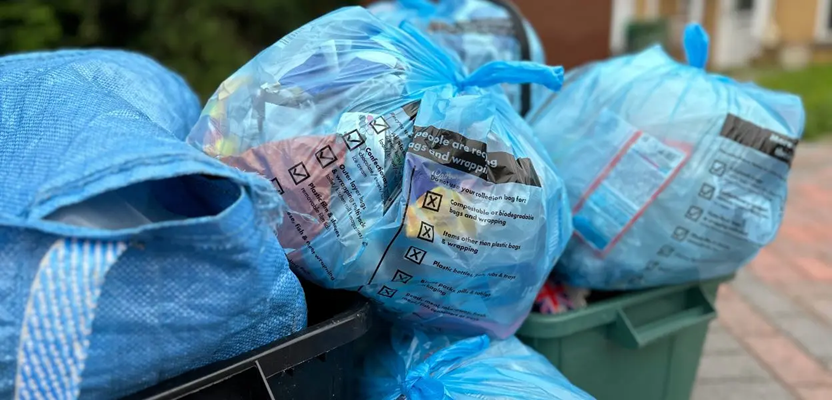A three-year project has helped set out a blueprint for planned nationwide collections of flexible plastic in the UK.
The FlexCollect research project, funded by the Flexible Plastic Fund, saw more than 400 tonnes of flexible plastic collected from 160,000 households across 10 local authorities that took part in the trials.
It showed encouraging results, with households giving the pilot project an 89% satisfaction rating overall, with rates as high as 96% in South Gloucestershire.
A final report on the project’s findings, published this week, comes ahead of mandatory flexible plastic collections in England from 2027 as part of the Simpler Recycling initiative.
Its evidence suggests kerbside collections of plastic wrappers, films and bags are popular, practical, and largely free from contamination.
However, it also highlights that billions more infrastructure investment is needed to ensure the material can be recycled at a nationwide scale.
What the trials achieved
The main take-home from the trials is that flexible plastic packaging can be successfully collected from households and recycled in the UK “with relative ease”.
Analysis across each pilot local authority suggested contamination of waste was low, and that households taking part in the trial were good at sorting their waste, which was largely “clean, dry, and free of food residues”.
It said 89% of material collected in the trial was material intended to be collected, while only 2% was “non-target recyclable plastic”, such as bottles and tubs made of harder plastic, while 9% was non-recyclable items.
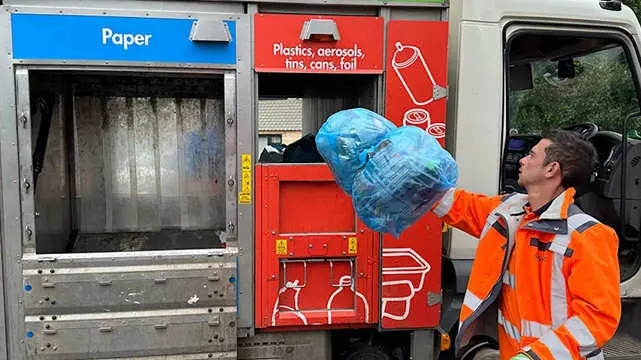
The trial suggests that generally, people are willing and able to sort their soft plastic. (Ecosurety)
The pilots found that providing a dedicated collection bag for flexible plastic packaging – placed inside or next to an existing recycling container – works across all vehicle types without the need for additional crew or shorter rounds.
Kerbside monitoring found average participation among households across the 10 councils was 60%, weekly collections yielding better results than fortnightly collections.
Over 400 tonnes of flexible plastic packaging was collected from 160,000 households during the trials – equivalent to more than 50 million bread bags.
Based on the FlexCollect project’s data and Office for National Statistics demographic data, the report estimates that over 150,000 tonnes of flexible plastic packaging can be expected to be collected from households in 2027.
It expects this to increase “quickly year on year to an estimated 200,000 tonnes per year by 2030”.
How did the project’s regions perform?
Collection trials were carried out in Cheltenham, South Gloucestershire, Maldon, Newcastle City, Somerset, Reading, North and East Herts, North West Leicestershire, Bracknell Forest, and Warwick District.
Some local authorities asked to put their designated flexible plastic bags in different places on collection day, for example in their dry mixed recycling bin, or next to their glass box.
Here are how some of the councils performed:
Somerset
Participation was “consistently among the highest” over the study’s three initial trial phases.
The report puts down to the area’s demographic (75% of whom fall into the suburbanite, peri-urbanite, and retired professional categories).
However, there did appear to be a drop off in participation as time went on, with the average weight of flexible plastic waste per household falling gradually by 25g per week.
“As this pattern has been observed in other areas, it is likely the result of residents running out of bags and not ordering more, highlighting the importance of effective communication,” the report says.
Households in Somerset also performed consistently well on sorting their recycling, with 83% of waste put in bags comprising of plastic bags and wrapping, in both July 2023 and March 2025.
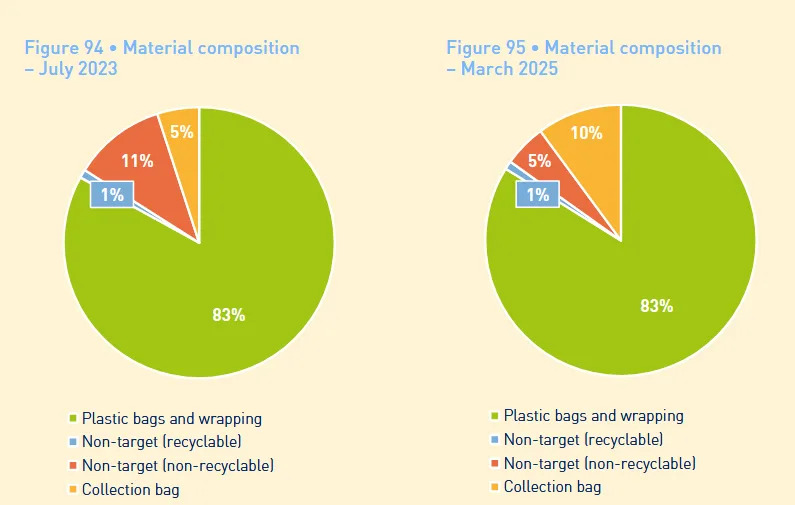
Residents in Somerset were among the best participants, the study showed. (FlexCollect)
Reading
Reading saw lower than average participation in the trials, which the report attributes to a higher proportion of “baseline UK”, low-skilled migrant and student demographics – groups “not linked with participation”.
However, collections picked up in the final phase (when the sample size had been expanded), with the average weight of each collection bag increasing to over half a kilogram.
Untied and contaminated bags were a “notable problem” in Reading, the report says, accounting for up to 50% of bags in the first phase.
The ratio between “good” and untied or contaminated bags did decrease over time, it adds, demonstrating an improvement in behaviour, although this could still present a challenge beyond trial level.
South Gloucestershire
South Gloucestershire Council were among the first to launch a service in 2022, as well as the first to expand their trial in 2024, taking the new total to 24,621 properties in May of last year.
Participation across the three pilot phases remained consistent at 40-42%, the report says, again pointing to the area’s high number of retired professional and suburbanite and peri-urbanite demographic groups.
It also says doorstep engagement, organised by both the council and waste reduction charity WRAP, helped keep engagement high.
Council leaders appear ready for the March 2027 deadline for nationwide flexible plastic collection, with cabinet member for communities Sean Rhodes calling the trial period a “rewarding journey”.
“We feel confident in our next steps to roll out flexible plastic collections to all households ahead of the March 2027 deadline, including flats where communal recycling is always more challenging,” he added.
What are flexible plastics?
Flexible plastics refer to packaging which flex easily, which can be made of both single and multiple layers of materials, the Department for Environment, Food and Rural Affairs says.
Common examples include bread bags, snack wrappers, netted produce bags, zipper-lock pouches, lidding film and sachets, the government department adds.
According to WRAP, one of the FlexCollect project’s partners, flexible plastic packaging represents a nearly a quarter of all UK consumer plastic packaging, but only 7% is recycled.
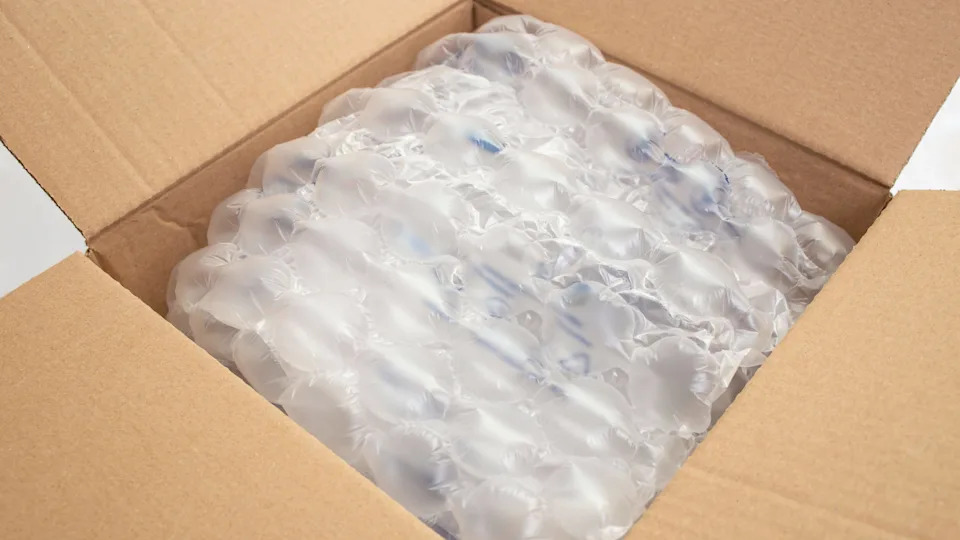
Flexible plastic, such as bubble wrap, accounts for nearly a quarter of consumer packaging in the UK, according to WRAP. (Alamy)
What happens next?
While the results of these trials are promising, the report notes that in the short to medium term, sorting infrastructure will not have the capability to process “mingled material” including flexible plastic.
“Therefore collection bags may well be prevalent among most local authorities,” it says, adding ensuring consistent delivery of these bags to residents will be essential to keep people recycling.
“It is evident that a large number of bags will be required in 2027 to support collection services for flexible plastic packaging,” the report says, adding that these bags can be produced by recycling flexible plastic.
While bags could be sourced more cheaply from overseas, the report encourages local authorities to consider sourcing domestically.
In the longer term, the report says the 2027 policy change will require £10bn of investment in the UK, including upgrades of materials recycling facilities to help them sort flexible plastics commingled with other waste.
“It is likely that materials recycling facility operators will gradually incorporate equipment to sort loose flexible plastic packaging from other material streams over time,” the report adds.
The report adds that there is “insufficient domestic end market capacity” to meet expected demand for soft plastic recycling treatment from 2027 onwards.
“Several mechanical and chemical recycling facilities are in development or planned, which, when combined with potential spare European capacity, would go a significant way to meet the full demand requirement.”
How this will be rolled out nationally?
The government has set a deadline of 31 March 2027 for mandatory kerbside collection of flexible plastics from households, businesses, non-domestic premises.
“To support plastic film recycling, residents will need to be informed about how to correctly recycle it, including any differences in disposal for biodegradable/compostable film,” the Local Government Association says.
In order for councillors to prepare for the deadline, the LGA recommends councils review their current waste and collection services and policies, to ensure they meet Simpler Recycling guidelines.
Councils should also consider the risks of locking into long-term contracts “to avoid everyone going to the market at the same time and cost increasing due to heightened demand”.
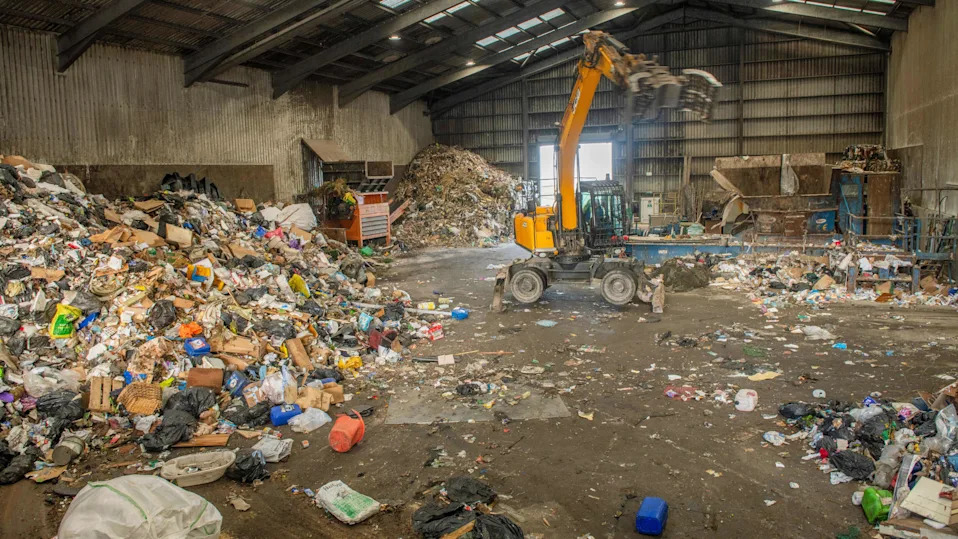
More investment is needed for recycling centres to sort through mixed streams of waste including flexible plastic. (Alamy)
Gareth Morton, discovery manager at recycling compliance scheme Ecosurety, which took part in the FlexCollect project, said collecting household flexible plastics “is not only possible, it’s popular, efficient and scalable”.
“The Blueprint is the culmination of years of hard work by the project partners, and a critical step towards a circular economic system for flexible plastic in the UK,” he said.
“But we’re not done yet, the FPF is planning its next major project, which will look at the necessary conditions required for industry to recycle this material at scale.”
Ecosurety chief technical development officer Stuart Hayward-Higham said the project “provides a clear roadmap for councils and the waste industry” ahead of the mandatory rollout.
“It’s a powerful signal that the groundwork is ready, and it’s time for the UK to invest in the infrastructure needed to recycle this material at a massive scale.”
Read more

